- Home
- Gaston Leroux
Collected Works of Gaston Leroux Page 25
Collected Works of Gaston Leroux Read online
Page 25
And the next moment, Mathilde Stangerson made her entrance into the church upon the arm of her father, Robert Darzac walking behind them. Ah, the drama of the Glandier had been a sorrowful one for these three! But, strange as it may seem, Mathilde Stangerson appeared only the more beautiful, for all that she had passed through. True, she was no longer the beautiful statue, the living marble, the ancient goddess, the cold Pagan divinity, who, at the official functions at which her father’s position had forced her to appear, had excited a flutter of admiration whenever she was seen. It seemed, on the contrary, that fate, in making her expiate for so many long years an imprudence committed in early youth, had cast her into the depths of madness and despair, only to tear away the mask of stone, which hid from sight the tender, delicate spirit. And it was this spirit which shone forth on her wedding day, in the sweetest and most charming smile, playing on her curved lips, hiding in her eyes, filled with pensive happiness, and leaving its impress on her forehead, polished like ivory, where one might read the love of all that was beautiful and all that was good.
As to her gown, I must acknowledge that I remember nothing at all about it, and am unable even to say of what color it was. But what I do remember, is the strange expression which came over her visage when she looked through the rows of faces in the pews without seeming to discover the one she sought. In a moment she had regained her composure, and was mistress of herself once more. She had seen Rouletabille behind his pillar. She smiled at him and my companions and I smiled in our turn.
“She has the eyes of a mad woman!”
I turned around quickly to see who had uttered the heartless, words. It was a poor fellow whom Robert Darzac, out of the kindness of his heart, had made his assistant in the laboratory at the Sorbonne. The man was named Brignolles, and was a distant cousin of the bridegroom. We knew of no other relative of M. Darzac whose family came originally from the Midi. Long ago he had lost both father and mother; he had neither brother nor sister, and seemed to have broken off all intercourse with his native province, from which he had brought an eager desire for success, an exceptional ability to work, a strong intellect, and a natural need for affection, which had satisfied itself in his relations with Professor Stangerson and his daughter. He had also as a legacy from Provence, his native place, a soft voice and slight accent, which had often brought a smile to the lips of his pupils at the Sorbonne, who, nevertheless, loved it as they might have loved a strain of music, which made the necessary dryness of their studies a little less arid.
One beautiful morning, in the preceding spring, and consequently a year after the occurrences in the yellow room, Robert Darzac had presented Brignolles to his pupils. The new assistant had come direct from Aix, where he had been a tutor in the natural sciences, and where he had committed some fault of discipline which had caused his dismissal. But he had remembered that he was related to M. Darzac, the famous chemist, had taken the train to Paris, and had told such a piteous tale to the fiancé of Mlle. Stangerson, that Darzac, out of pity, had found means to associate his cousin with him in his work. At that time, the health of Robert Darzac had been far from flourishing. He was suffering from the reaction following the strong emotions which had nearly weighed him down at the Glandier and at the Court of Assizes; but one might have thought that the recovery, now assured, of Mathilde, and the prospect of their marriage would have had a happy influence both upon the mental and physical condition of the professor. We, however, remarked on the contrary, that from the day that Brignolles came to him — Brignolles, whose friendship should have been a precious solace, the weakness of M. Darzac seemed to increase. However, we were obliged to acknowledge that Brignolles was not to blame for that, for two unfortunate and unforeseen accidents had occurred in the course of some experiments, which would have seemed, on the face of them, not at all dangerous. The first resulted from the unexpected explosion of a Gessler tube, which might have severely injured M. Darzac, but which only injured Brignolles, whose hands were badly scarred. The second, which might have been extremely grave, happened through the explosion of a tiny lamp against which M. Darzac was leaning. Happily, he was not hurt, but his eyebrows were scorched, and for some time after his sight was slightly impaired, and he was unable to stand much sunlight.
Since the Glandier mysteries, I had been in such a state of mind that I often found myself attaching importance to the most simple happenings. At the time of the second accident I was present, having come to seek M. Darzac at the Sorbonne. I myself led our friend to a druggist and then to a doctor, and I (rather dryly, I own) begged Brignolles, when he wished to accompany us, to remain at his post. On the way, M. Darzac asked why I had wounded the poor fellow’s feelings. I told him that I did not care for Brignolles’ society, for the abstract reason that I did not like his manners, and for the concrete reason, on this special occasion, that I believed him to be responsible for the accident. M. Darzac demanded why I thought so, and I did not know how to answer, and he began to laugh — a laugh that was quickly silenced, however, when the doctor told him that he might easily have been made entirely blind, and that he might consider himself very lucky in having gotten off so well.
My suspicions of Brignolles were, doubtless, ridiculous, and no more accidents happened. All the same, I was so strongly prejudiced against the young man that, at the bottom of my heart, I blamed him for the slow improvement in M. Darzac’s physical condition. At the beginning of the winter Darzac had such a bad cough that I entreated him to ask for leave of absence and to take a trip to the Midi — a prayer in which all his friends joined. The physicians advised San Remo. He went thither, and a week later he wrote us that he felt much better — that it seemed to him as though a heavy weight had been lifted from his breast. “I can breathe here,” he wrote. “When I left Paris, I seemed to be stifling.”
This letter from M. Darzac gave me much food for thought, and I no longer hesitated to take Rouletabille into my confidence.
He agreed with me that it was a most peculiar coincidence that M. Darzac was so ill when Brignolles was with him and so much better when he and his young assistant were separated. The impression that this was actually the fact was so strong in my mind that I would on no account have permitted myself to lose sight of Brignolles. No, indeed. I verily believe that if he had attempted to leave Paris, I should have followed him. But he made no such attempt. On the contrary, he haunted the footsteps of M. Stangerson. Under the pretext of asking news of M. Darzac, he presented himself at the house of the Professor almost every day. Once he made an effort to see Mlle. Stangerson, but I had painted his portrait to M. Darzac’s fiancée in such unflattering terms, that I had succeeded in disgusting her with him completely — a fact on which I congratulated myself in my innermost soul.
M. Darzac remained four months at San Remo, and returned home at the end of that time almost completely restored to health. His eyes, however, were still weak, and he was under the necessity of taking the greatest care of them. Rouletabille and myself had resolved to keep a close watch on Brignolles, but we were satisfied that everything would be right when we were informed that the long-deferred marriage was to occur almost immediately and that M. Darzac would take his wife away on a long honeymoon trip far from Paris — and from Brignolles.
Upon his return from San Remo, M. Darzac had asked me:
“Well, how are you getting on with poor Brignolles? Have you decided that you were wrong about him?”
“Indeed, I have not,” was my response.
And Darzac turned away, laughing at me, and uttering one of the Provencal jests which he affected when circumstances allowed him to be gay, and which found on his lips a new freshness since his visit to the Midi had accustomed him again to the accents of his childhood.
We knew that he was happy. But we had formed no real idea of how happy he was — for between the time of his return and the wedding day we had had few chances to see him — until we beheld him walking up the aisle of the church, his face fairly transform
ed. His slight erect figure bore itself as proudly as though he were an Emperor. Happiness had made him another being.
“Anyone could guess that he was a bridegroom!” tittered Brignolles.
I left the neighborhood of the man who was so repulsive to me, and stepped behind poor M. Stangerson, who stood through the entire ceremony with his arms crossed on his breast, seeing nothing and hearing nothing. I was obliged to touch him on the shoulder when all was over to arouse him from his dream.
As they passed into the sacristy, M. Andre Hesse heaved a deep sigh.
“I can breathe again,” he murmured.
“Why couldn’t you breathe before, my friend?” asked M. Henri-Robert.
And M. Andre Hesse confessed that he had feared up to the last moment that the dead man would reappear.
“I can’t help it,” was the only response he would make when his friend rallied him. “I cannot bring myself to the idea that Frederic Larsan will stay dead for good.”
And now we all — a dozen or so persons — were gathered in the sacristy. The witnesses signed the register, and the rest of us congratulated the newly wedded pair. The sacristy was yet more dismal than the church, and I might have thought that it was on account of the darkness that I could not perceive Joseph Rouletabille, if the room had not been so small. But, assuredly, he was not there. Mathilde had already asked for him twice, and M. Darzac requested me to go and look for him. I did so, but returned to the vestry without him. He had disappeared from the church.
“How strange it is!” exclaimed M. Darzac. “I can’t understand it. Are you sure that you looked everywhere? He may be in some corner dreaming.”
“I looked everywhere, and I called his name,” I told him.
But M. Darzac was still not satisfied. He wanted to look through the church for himself. His search was better rewarded than mine, for he learned from a beggar, who was sitting in the porch with a tambourine, that Rouletabille had left the church a few minutes before and had been driven away in a hack. When the bridegroom brought this news to his wife, she appeared to be both pained and anxious. She called me to her side and said:
“My dear M. Sainclair, you know that we are to take the train in two hours. Will you hunt up our little friend and bring him to me, and tell him that his strange behaviour is grieving me very much?”
“Count upon me,” I said.
And I began a wild goose chase after Rouletabille. But I appeared at the station without him. Neither at his home, nor at the office of his paper, nor at the Cafe du Barreau, where the necessities of his work often called him at this hour of the day, could I lay my hand on him. None of his comrades could tell me where I might chance to find him. I leave you to think how unwillingly I turned my steps in the direction of the railroad station. M. Darzac was greatly disturbed, but as he had to look after the comfort of his fellow travellers (for Professor Stangerson, who was on his way to Mentone, was to accompany his daughter and her husband to Dijon, changing cars there, while the Darzacs continued their trip to Culoz and Mt. Cenis), he asked me to break the bad news to his bride. I performed the commission, adding that Rouletabille would, without doubt, present himself before the train started. At these words, Mathilde began to cry softly, and shook her head:
“No — no!” she whispered. “It is all over. He will never come again.”
And she stepped into the railway carriage.
It was at this point that the insufferable Brignolles, seeing the emotion of the newly-made bride, whispered again to M. Andre Hesse, “Look! Look! Hasn’t she the eyes of a maniac? Ah, Robert has done wrong. It would have been better for him to wait.” M. Hesse gave him a disdainful glance, and bade him be silent.
I can still see Brignolles as he spoke those words, and can recall as vividly as though it were yesterday the feeling of horror with which he inspired me. There was no longer any doubt in my mind that he was an evil and a jealous man, and that he would never forgive his relative for having placed him in a position which might be considered subordinate. He had a yellow face and long features that looked as if they had been drawn down from forehead to chin. Everything about him seemed to diffuse bitterness and everything about him was long. He had a long figure, long arms, long legs and a long head. However, to this general rule of length, there were exceptions — the feet and the hands. He had extremities small and almost beautiful.
After having been so rudely silenced for his malicious words by the young lawyer, Brignolles immediately took offense and left the station, after having paid his respects to the bride and bridegroom. At least, I believe that he left the station, for I did not see him again.
There was three minutes yet before the departure of the train. We still hoped that Rouletabille would appear, and we looked across the quay, thinking once or twice that we saw the form of our young friend approaching, among the hurrying throng of travellers. How could it be that he would not advance, as we were so used to seeing him, in his quick, boyish fashion, rushing through the crowd, paving no heed to the cries and protestations that his method of pushing his way usually evoked while he seemed to be hurrying faster than any one else? What could he be doing that detained him?
Already the doors were closed. The bell on the engine began to sound its first slow strokes, and the calls of hack drivers began to arise: “Carriage, Monsieur? Carriage?” And then the quick last word which gave the signal for the departure. But no Rouletabille. We were all so grieved, and, moreover, so surprised, that we remained on the platform, looking at Mme. Darzac, without thinking to wish her a pleasant journey. Professor Stangerson’s daughter cast a long glance upon the quay, and, at the moment that the speed of the train began to accelerate, certain now that she was not to see her “little friend” again, she threw me an envelope from the car window.
“For him,” she said.
And almost as though moved by an irresistible impulse, her face wearing an expression of something that resembled terror, she added in a tone so strange that I could not help recalling the horrible speeches of Brignolles:
“Au revoir, my friends — or adieu.”
CHAPTER II
IN WHICH THERE IS QUESTION OF THE CHANGING HUMORS OF JOSEPH ROULETABILLE
IN RETURNING ALONE from the station I could not help feeling some surprise at the singular sensation of sadness which oppressed me, and of the cause of which I had not the least idea. Since the affair at Versailles, with the details of which my existence had become so strangely intermingled, I had enjoyed the closest intimacy with Professor Stangerson, his daughter, and Robert Darzac. I ought to have been completely happy on the day of this wedding, which seemed in every way so satisfactory. I wondered whether the unexplained absence of the young reporter did not account in some measure for my strange depression. Rouletabille had been treated by the Stangersons and by M. Darzac as their deliverer. And especially since Mathilde had left the sanatorium, in which, for several months, her shattered nervous system had needed and received the most assiduous care — since the daughter of the famous professor had been able to understand the extraordinary part which the boy had played in the drama that, without his help, would inevitably have ended in the bitterest grief for all those whom she loved — since she had read by the light of her restored reason the short-hand reports of the trial, at which Rouletabille appeared at the last moment like some hero of a miracle — she had surrounded the youngster with an affection little less than maternal. She interested herself in everything which concerned him; she begged for his confidence; she wanted to know more about him than I knew, and, perhaps, more even than he knew himself. She had shown an unobtrusive but strong curiosity in regard to the mystery of his birth, of which all of us were ignorant, and on which the young man had kept silence with a sort of savage pride. Although he fully realized the tender friendship which the poor soul felt for him, Rouletabille maintained his reserve and in his dealings with her affected a formal politeness which astonished me, coming from the boy whom I had known so exuberant, so whole
-hearted, so strong in his likes and dislikes. More than once I had mentioned the matter to him, and he had answered me in an evasive manner, laying great stress, however, upon his sentiments of devotion for “a lady whom he esteemed beyond anyone in the world, and for whom he would have been ready to sacrifice his all, if fate or fortune had given him anything to sacrifice for anyone.” He would take strange whims at such times. For instance, after having made, in my presence, a promise to take a holiday and remain all day with the Stangersons, who had rented for the summer (for they did not wish to live at the Glandier again) a pretty little place at Chennevieres, on the borders of the Marne, and after having shown an almost childish joy at the prospect, he suddenly and without any reason refused to accompany me. And I was obliged to set out alone, leaving him in his little room, in the corner of the Boulevard St. Michel and the Rue Monsieur-le-Prince. I wished as I departed that he might experience as much pain as I knew that he would cause Mlle. Stangerson. One Sunday, she, vexed at the lad’s behaviour, made up her mind to go with me to his den in the Latin Quarter, and surprise him.
When we reached his lodgings, Rouletabille, who had answered our knock with an energetic “Come in,” sat working at a little table. He arose as we entered, and turned so pale that we believed that he was about to fall in a faint.
“Good heavens!” cried Mlle. Stangerson, hastening toward him. But he was quicker than she, and before she reached the table on which he leaned, he had thrown a cover over the papers which were spread over the surface, hiding them entirely.
Mathilde had, of course, noticed the action. She paused in amazement.
“We are disturbing you,” she said.
“Oh, not at all,” replied Rouletabille. “I have finished my work. I will show it to you sometime. It is a masterpiece — a piece in five acts, for which I am not able to find the denouement.”

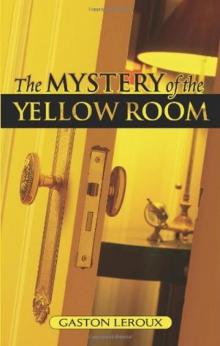 The Mystery of the Yellow Room
The Mystery of the Yellow Room The Secret of the Night
The Secret of the Night In Letters of Fire
In Letters of Fire The Phantom of the Opera
The Phantom of the Opera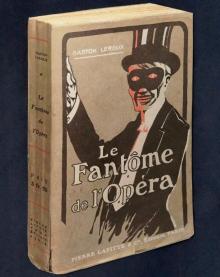 Fantôme de l'Opéra. English
Fantôme de l'Opéra. English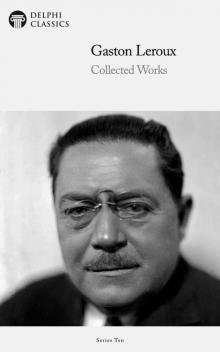 Collected Works of Gaston Leroux
Collected Works of Gaston Leroux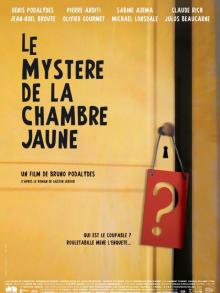 Le mystère de la chambre jaune. English
Le mystère de la chambre jaune. English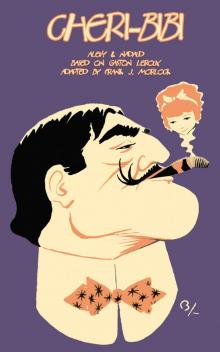 Cheri-Bibi: The Stage Play
Cheri-Bibi: The Stage Play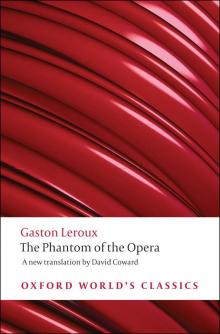 The Phantom of the Opera (Oxford World's Classics)
The Phantom of the Opera (Oxford World's Classics)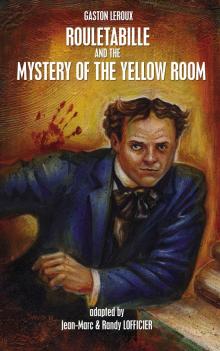 Rouletabille and the Mystery of the Yellow Room
Rouletabille and the Mystery of the Yellow Room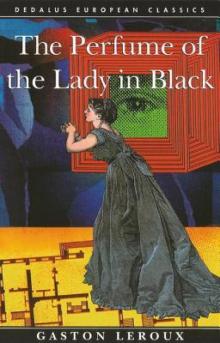 The Perfume of the Lady in Black
The Perfume of the Lady in Black The Bloody Doll
The Bloody Doll Rouletabille at Krupp's
Rouletabille at Krupp's Phantom of the Opera (Barnes & Noble Classics Series)
Phantom of the Opera (Barnes & Noble Classics Series)